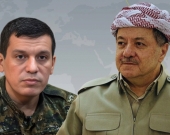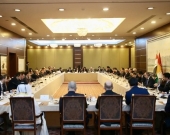Iran nuclear talks: Tehran 'will not step back one iota'

Ayatollah Ali Khamenei said he would not intervene directly in the negotiations, but that he had set "red lines" for Iran's representatives.
President Barack Obama meanwhile urged US senators not to impose new sanctions on Iran to allow time for diplomacy.
He was unsure if it would be possible to reach an interim agreement soon.
"We don't know if we'll be able to close a deal with Iran this week or next week," he told a Wall Street Journal (WSJ) forum in Washington on Tuesday.
Iran stresses that its nuclear programme is for peaceful purposes only, but world powers suspect it is seeking to develop nuclear weapons.
Some meetings between delegates have already been held in Geneva, ahead of Wednesday's first plenary session.
Meanwhile, Israeli Prime Minister Benjamin Netanyahu has flown to Moscow to meet President Vladimir Putin.
Mr Netanyahu has expressed vehement opposition to the deal that has been floated with Iran, and is expected to press Mr Putin to harden Russia's stance.
'Way forward'
In a televised speech to Basij militiamen on Wednesday, Ayatollah Khamenei said Iran's negotiators had been set clear limits before they travelled to Switzerland for two days of meetings with representatives of the P5+1 - the US, UK, France, China and Russia, plus Germany.
They failed to agree a deal at a previous round of talks earlier this month mainly because of what diplomats said was Iran's insistence on formal recognition of its "right" to enrich uranium and France's concerns about the heavy-water reactor being built at Arak.
"We do insist that we will not step back one iota from our rights," Ayatollah Khamenei said.
But he added: "We do not intervene in the details of these talks. There are certain red lines and limits. These have to be observed."
The Supreme Leader, who has final say in Iran's nuclear matters, warned the P5+1 not to "ratchet up the pressure".
"They should know that the Iranian nation respects all nations of the world, but we will slap aggressors in the face in such a way they will never forget it."
Ayatollah Khamenei also said French leaders were "not only succumbing to the United States, but they are kneeling before" Israel, which he described as "the rabid dog of the region".
A French foreign ministry spokeswoman said President Francois Hollande believed the comments were "unacceptable" and would complicate negotiations.
The talks in Geneva will be led in the first instance by the EU's foreign policy chief, Baroness Catherine Ashton, and Iran's Foreign Minister Mohammad Javad Zarif.
The pair met on Wednesday afternoon in bilateral talks Mr Zarif described as "good".
The US team has held its own meeting with counterparts in the P5+1.
'Vigorous inspections'
Mr Obama told the WSJ forum that any interim agreement - expected to last six months - would see the bulk of international and US sanctions targeting the Islamic Republic's nuclear programme remain in place.
Mr Obama explained the essence of the deal would involve Iran halting advances of its nuclear programme and agreeing to "more vigorous inspections" in return for "a very modest amount of relief".
During a visit to Israel on Sunday, President Hollande said Iran would have to agree to halting its enrichment of uranium to a medium level of purity, or 20%; reducing its existing stockpile of enriched uranium, and stopping the construction of the Arak heavy-water reactor.
Experts say Iran's 20%-enriched uranium could be enriched to weapons-grade, or 90%, in a relatively short time, while spent fuel from the Arak reactor will contain plutonium suitable for use in nuclear weapons.
BBC












